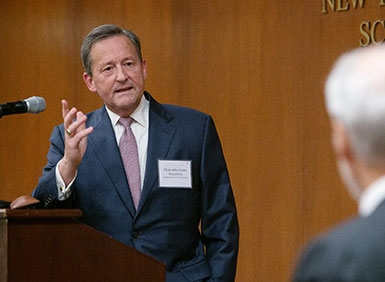Chancellor Andre Bouchard of Delaware's Court of Chancery considers how two recent rulings have changed mergers and acquisitions litigation
At the Institute for Corporate Governance & Finance’s Annual Distinguished Jurist Lecture on November 13, Chancellor Andre Bouchard of the Delaware Court of Chancery discussed the impact of two significant cases for which he issued opinions shortly after he joined the court in 2014.
In litigation challenging a merger between KKR & Co. LLP and KKR Financial Holdings LLC, Bouchard held that the business judgment rule—and not the more exacting entire fairness doctrine—was an appropriate standard of review for a damages action filed after the close of a merger that had been approved by a fully informed and uncoerced majority of disinterested stockholders. In Corwin v. KKR Financial Holdings LLC (2015), the Delaware Supreme Court upheld his decision.
The case, Bouchard said, has given rise to the doctrine of “Corwin cleansing,” which “provides a potential off-ramp for early-stage dismissal of post-closing damages cases challenging M&A transactions that don’t involve a controlling stockholder.”
Early in 2016, Bouchard issued an opinion in another significant case, In re Trulia, Inc. Stockholder Litigation. The decision indicated that the Court of Chancery would no longer routinely approve “disclosure only” settlements—settlements in which merging companies make supplemental disclosures to shareholders and pay the plaintiff class’s attorneys’ fees in exchange for the plaintiffs’ dropping their efforts to enjoin the merger. A marked rise in such settlements beginning in 2005 prompted Bouchard and his colleagues to reevaluate the practice and dramatically circumscribe the conditions under which it would be implemented.
In his remarks, Bouchard called Trulia “a matter of good corporate hygiene.” He added: “And now, having essentially four years of cases to grade our performance, I’m generally pleased to see that courts in other jurisdictions largely seem to agree with Trulia. Virtually nobody argues against the idea that there needs to be a higher level of scrutiny, with one or two notable exceptions.”
Posted January 10, 2020


